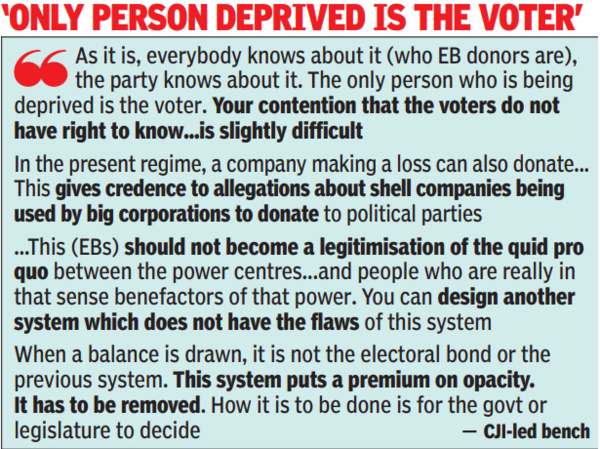Note4Students
From UPSC perspective, the following things are important :
Prelims level: Electoral Trusts Scheme Electoral Bond Scheme
Mains level: Opacity and anonymity in corporate donations.

Key Highlights:
- Tradition of Secrecy: Indian political parties, historically resistant to public scrutiny, operate in a culture of secrecy regarding their funding sources and applications.
- Corporate Dependency: The exorbitant funds required for political processes and operations often come from Big Business entities, creating a financial reliance on these corporations.
- Quid Pro Quo: Political parties, in return for financial support from corporations, are often expected to reciprocate with political favors, creating a symbiotic relationship between the two.
- Voter Empowerment: Civil society campaigns, notably through Public Interest Litigation (PIL), seek to empower voters by improving access to background information on electoral candidates.
- Challenging Legislative Opacity: PIL serves as a tool to challenge legislative attempts to obscure the identities of corporate donors, promoting transparency in political funding.
- Democratic Right to Information: The campaign is grounded in the citizen’s democratic right to information, an integral aspect of the fundamental right to speech and expression under the Constitution.
- Countering Legislative Maneuvers: PIL acts as a countermeasure against legislative maneuvers designed to undermine transparency in political funding.
Challenges:
- Hiding Corporate Donors: Political establishments employ legislative tactics to conceal the identities of corporate donors, preventing public awareness of the financial backers of political parties.
- Electoral Trusts and Bond Schemes: The introduction of schemes like the Electoral Trusts Scheme (2013) and the Electoral Bond Scheme (EBS) creates barriers that obscure the direct link between political parties and their corporate donors.
- Transparency Concerns: Legislative changes raise concerns about jeopardizing transparency, incentivizing corrupt practices, and limiting the accountability of political parties.
- Nexus Between Politics and Business: The legislative landscape contributes to a growing perception of a nexus between political entities and big business, raising questions about ethical governance.
Key Phrases for value addition:
- Amendments Under Scrutiny: Recent amendments in the legal framework of corporate donations face scrutiny and constitutional challenges.
- ‘Right to Know’ Infringement: Allegations arise that these amendments infringe upon the citizen’s fundamental ‘Right to know’ under Article 19(1)(a) of the Constitution.
- Transparency Need: The importance of transparency in political funding is emphasized as a cornerstone of a healthy and accountable democratic process.
- Autonomy Compromise: Concerns are raised about the compromise of the country’s autonomy, with potential negative impacts on governance and democratic values.
Analysis
- Undermining Transparency: Legislative changes are criticized for undermining transparency, creating a more opaque environment in political funding.
- Electoral Bond Scheme Critique: The Electoral Bond Scheme (EBS) faces critique for introducing opacity in political funding, limiting citizens’ access to vital information concerning electoral financing.
- Opacity in Politics and Business: The intertwining opacity in political and business spheres is identified as a growing trend with potential repercussions for democratic processes.
- Influence of Special Interest Groups: Critics argue that legislative changes enable special interest groups, corporate lobbyists, and foreign entities to exert undue influence on the electoral process.
Key Data for mains value addition:
- Favored Donation Mode: Electoral bonds have become the favored mode of political donation due to their anonymity features.
- ₹13,791 Crore Sales: Until July 2023, electoral bonds amounting to ₹13,791 crore have been sold in 27 tranches.
- 55.9% Donation Share: Electoral bonds contribute significantly, accounting for 55.9% of political donations received by 31 parties.
- BJP’s Leading Redemption: The BJP leads in the redemption of electoral bonds, with 74.5% of the total until 2020-2021.
Key Facts:
- Opacity and Corruption Concerns: Critics express concerns about the opacity introduced by legislative changes, potentially incentivizing corrupt practices in political funding.
- Majority Cash Dealings: Despite the availability of formal options like electoral bonds, the majority of political dealings continue to be in cash.
- Electoral Bond Impact: Receipts from electoral bonds enable political parties to engage in formal economy transactions, covering infrastructure, equipment, and media publicity costs.
- Ongoing Legislative Scrutiny: Legislative changes continue to undergo scrutiny, impacting transparency and accountability in political funding.
Key Terms:
- Electoral Trusts Scheme
- Electoral Bond Scheme
- Right to Know
- Corporate Donations
- Transparency
- Corruption
- Political Funding
- Constitutional Challenges
Way Forward:
- Hopes for a Level Playing Field: Expectations are pinned on judicial intervention to ensure a more level playing field in future elections.
- Upholding Freedom of Speech: The judiciary is anticipated to play a crucial role in upholding the right to freedom of speech and expression, empowering voters with information.
- Addressing Transparency Concerns: Recognizing the critical need for transparency, steps are expected to be taken to address concerns related to opacity and anonymity in corporate donations.
- Judicial Scrutiny Importance: The importance of judicial scrutiny in ensuring the preservation of democratic values and principles is emphasized.
Get an IAS/IPS ranker as your 1: 1 personal mentor for UPSC 2024
